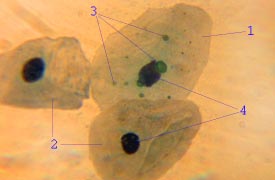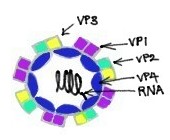Asthma-related microbes
Asthma is a chronic inflammatory disease of the airways characterized by variable and recurring symptoms, airflow obstruction, and bronchospasm. Recent studies have suggested that certain microbes may play a role in the development and exacerbation of asthma. This article explores the relationship between asthma and specific microbes, including Chlamydia pneumoniae, Mycoplasma pneumoniae, and Human rhinovirus.
Chlamydia pneumoniae[edit | edit source]
Chlamydia pneumoniae is a species of bacteria that can cause respiratory tract infections. It has been implicated in the exacerbation of asthma symptoms. The bacterium is known to infect the epithelial cells of the respiratory tract, leading to inflammation and potentially worsening asthma control. Studies have shown that patients with asthma may have a higher prevalence of C. pneumoniae infection compared to non-asthmatic individuals.
Mycoplasma pneumoniae[edit | edit source]
Mycoplasma pneumoniae is a type of bacteria that lacks a cell wall and is known to cause atypical pneumonia. It has also been associated with asthma exacerbations. M. pneumoniae can trigger immune responses that lead to increased airway inflammation and hyperreactivity, which are hallmarks of asthma. The presence of M. pneumoniae in the respiratory tract of asthmatic patients may contribute to the severity and frequency of asthma attacks.
Human rhinovirus[edit | edit source]
Human rhinovirus is a common viral infectious agent that causes the common cold. It is one of the most frequent triggers of asthma exacerbations, especially in children. The virus infects the upper respiratory tract and can lead to increased airway inflammation and obstruction in asthmatic individuals. Rhinovirus infections are associated with increased morbidity in asthma patients, and managing these infections is crucial for controlling asthma symptoms.
Related pages[edit | edit source]
Search WikiMD
Ad.Tired of being Overweight? Try W8MD's physician weight loss program.
Semaglutide (Ozempic / Wegovy and Tirzepatide (Mounjaro / Zepbound) available.
Advertise on WikiMD
|
WikiMD's Wellness Encyclopedia |
| Let Food Be Thy Medicine Medicine Thy Food - Hippocrates |
Translate this page: - East Asian
中文,
日本,
한국어,
South Asian
हिन्दी,
தமிழ்,
తెలుగు,
Urdu,
ಕನ್ನಡ,
Southeast Asian
Indonesian,
Vietnamese,
Thai,
မြန်မာဘာသာ,
বাংলা
European
español,
Deutsch,
français,
Greek,
português do Brasil,
polski,
română,
русский,
Nederlands,
norsk,
svenska,
suomi,
Italian
Middle Eastern & African
عربى,
Turkish,
Persian,
Hebrew,
Afrikaans,
isiZulu,
Kiswahili,
Other
Bulgarian,
Hungarian,
Czech,
Swedish,
മലയാളം,
मराठी,
ਪੰਜਾਬੀ,
ગુજરાતી,
Portuguese,
Ukrainian
Medical Disclaimer: WikiMD is not a substitute for professional medical advice. The information on WikiMD is provided as an information resource only, may be incorrect, outdated or misleading, and is not to be used or relied on for any diagnostic or treatment purposes. Please consult your health care provider before making any healthcare decisions or for guidance about a specific medical condition. WikiMD expressly disclaims responsibility, and shall have no liability, for any damages, loss, injury, or liability whatsoever suffered as a result of your reliance on the information contained in this site. By visiting this site you agree to the foregoing terms and conditions, which may from time to time be changed or supplemented by WikiMD. If you do not agree to the foregoing terms and conditions, you should not enter or use this site. See full disclaimer.
Credits:Most images are courtesy of Wikimedia commons, and templates, categories Wikipedia, licensed under CC BY SA or similar.
Contributors: Prab R. Tumpati, MD


